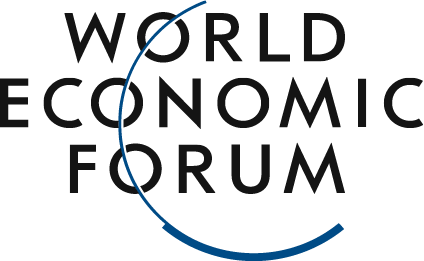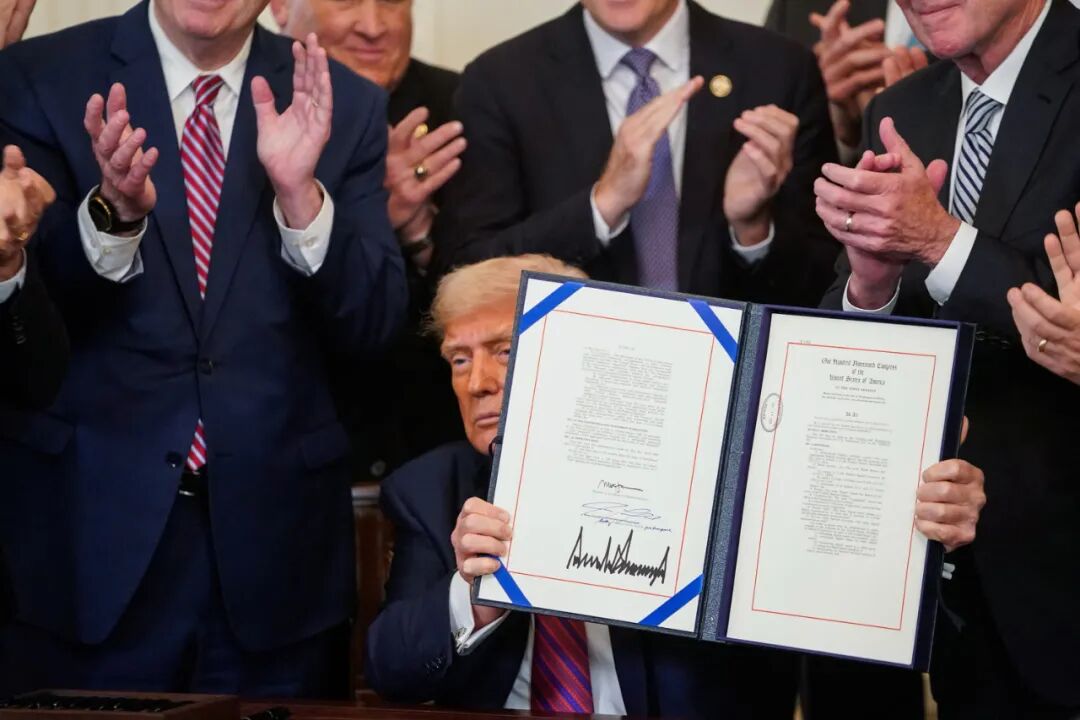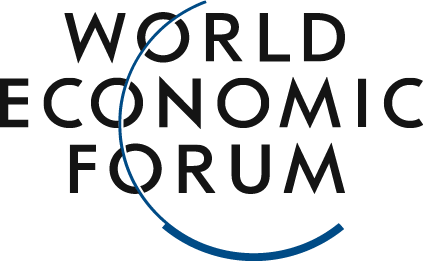

U.S. President Donald Trump signed the "Genius Act" on July 18, 2025.
Image source: Reuters/Nathan Howard
Sandra Waliczek
Head of Blockchain and Digital Assets at the World Economic Forum
Harry Yeung
World Economic Forum on Financial and Monetary Services
Members of the Technology and Innovation ECP Program, Spring 2025
"The Genius Act" is the first comprehensive U.S. legislation targeting stablecoins.
The European Union and Hong Kong, China, have also introduced regulations related to stablecoins.
While the "Genius Act" has brought regulatory clarity, there remains an urgent need for global coordination, consumer protection, and broader cryptocurrency oversight.
Last week, U.S. President Donald Trump signed the GENIUS Act, officially titled the "Guaranteeing Essential National Infrastructure in U.S.-Stablecoins Act," marking the first major cryptocurrency legislation passed by the U.S. Congress. The bill focuses specifically on stablecoins, establishing guiding principles for regulating these digital currencies within the United States.
Stablecoins have quickly become one of the most closely watched topics for global financial institutions and governments, with their usage and influence expanding rapidly—growing by 28% compared to the same period last year. In 2024, their transaction volume already surpassed the combined totals of Visa and Mastercard. Yet, globally, fewer than 10 major economies have actually adopted dedicated legislation specifically targeting stablecoins.
What is the "Genius Act"?
The "Talent Act" marks a crucial first step for the U.S. in regulating stablecoins legislatively. With this legislation, the U.S. joins the growing number of countries striving to oversee the rapidly expanding digital asset ecosystem while ensuring its stability. The bill aims to provide the industry with a clear and comprehensive regulatory framework.
The "Genius Act" includes three key provisions:
Stablecoin issuers are limited to insured depository institutions, such as banks, credit unions, bank subsidiaries, and non-bank financial institutions that have received Federal Reserve approval and demonstrate the ability to comply with applicable laws.
Stablecoin issuers are required to hold 1:1 reserves for every stablecoin they issue. These reserves may be held in the form of physical currency, U.S. Treasury securities, repurchase agreements, and other low-risk assets approved by regulatory authorities. Issuers must disclose the composition of their reserves and undergo regular audits conducted by registered public accounting firms.
The bill stipulates that all stablecoin issuers must comply with the Bank Secrecy Act, ensuring that these institutions implement anti-money laundering (AML) and counter-terrorism financing (CFT) measures, while also strengthening consumer protection.
How does the "Genius Act" compare to other global stablecoin regulations?
Multiple jurisdictions around the globe are developing regulations for stablecoins. For instance, in December 2024, the European Union’s Markets in Crypto-Assets Regulation (MiCA) officially came into effect, and Hong Kong recently unveiled its Stablecoin Ordinance.
In the EU, the MiCA framework addresses stablecoin regulation. While the legislation doesn’t explicitly mention stablecoins, it focuses instead on two types of tokens: Electronic Money Tokens (EMTs) and Asset-Reference Tokens (ARTs). EMTs are digital tokens backed by a single fiat currency, whereas ARTs are backed by a basket of assets—including potentially physical assets, cryptocurrencies, or other holdings. Under MiCA regulations, only electronic money institutions or credit institutions are permitted to issue EMTs, while ART issuers must be based within the EU and hold authorization from a regulatory authority.
Meanwhile, Hong Kong's "Stablecoin Ordinance," enacted in May 2025, is among the more recent stablecoin legislations globally. Under this law, all entities issuing stablecoins backed by the Hong Kong dollar must obtain authorization from the Hong Kong Monetary Authority. Additionally, each stablecoin must be fully backed by high-quality, highly liquid reserve assets, with the market value of the reserve pool precisely matching the face value of the stablecoins currently in circulation. Issuing institutions are also required to comply with stringent regulations—such as anti-money laundering (AML) and counter-terrorism financing (CFT) measures—as well as undergo regular audits and transparent disclosure requirements.
How has the "Genius Act" been received?
The "Genius Act" has sparked widespread reactions both domestically in the U.S. and internationally. President Trump stated that the bill "will position America as the undisputed leader in the digital asset space." Professor Barry Eichengreen from the University of California, Berkeley, noted: "If panicked customers force stablecoin issuers to sell off the government bonds backing the stablecoins, bond prices could collapse, triggering a sharp rise in interest rates and destabilizing not only other financial markets but also the broader economy."
At the global level, Chinese state media has called for advancing a digital currency backed by the renminbi "sooner rather than later." Given that the "Genius Act" could potentially accelerate the global spread of the U.S. dollar and deepen dollarization worldwide, Zhou Xiaochuan, former governor of the People's Bank of China, warned: "Unless faced with extreme and severe circumstances—such as tackling high inflation or overwhelming debt burdens—pursuing dollarization could lead to numerous negative consequences."
In the European Union, European Central Bank President Christine·Lagarde expressed similar concerns, emphasizing that dollar-denominated stablecoins could pose a threat to monetary policy and Europe's economic sovereignty, while also calling for an accelerated development of the digital euro.
What will happen next?
Although the "Genius Act" has taken a step forward in establishing clear regulations, much more progress remains to be made. Here are three recommendations to ensure consistent and comprehensive global stablecoin oversight:
1. Emphasize consumer protection
Establishing clear and consistent global consumer protection guidelines is key to earning public trust.
2. Establishing Global Standards for Stablecoin Regulation
In 2020, the Group of Twenty (G20) released the "Crypto-Asset Policy Implementation Roadmap," which was updated in 2023 by the Financial Stability Board (FSB). The updated roadmap includes a set of high-level recommendations on global stablecoin arrangements. The FSB’s recommendations emphasize: cross-border cooperation and information sharing; transparent disclosure of reserve composition, redemption rights, and associated risks; and adherence to global Anti-Money Laundering/Counter-Terrorist Financing (AML/CFT) measures. Any future regulatory frameworks should continue to align with globally interoperable regulatory standards.
3. Public-Private Partnership
Continuous communication between the public and private sectors is essential to ensure that stablecoin development progresses toward shared goals.
Even beyond stablecoins, other areas of the digital asset ecosystem—such as decentralized finance and the broader crypto asset space—require more comprehensive global regulation. Although the "Talents Act" has already been passed, the U.S. continues to advance its regulatory efforts, including the proposed CLARITY Act, which addresses the structure of crypto asset markets. As global adoption of digital assets continues to surge, clarity in regulation remains critical.

The above content represents the author's personal views only.This article is translated from the World Economic Forum's Agenda blog; the Chinese version is for reference purposes only.Feel free to share this in your WeChat Moments; please leave a comment at the end of the post or on our official account if you’d like to republish.
Translated by: Sun Qian | Edited by: Wang Can
The World Economic Forum is an independent and neutral platform dedicated to bringing together diverse perspectives to discuss critical global, regional, and industry-specific issues.
Follow us on Weibo, WeChat Video Accounts, Douyin, and Xiaohongshu!
"World Economic Forum"


